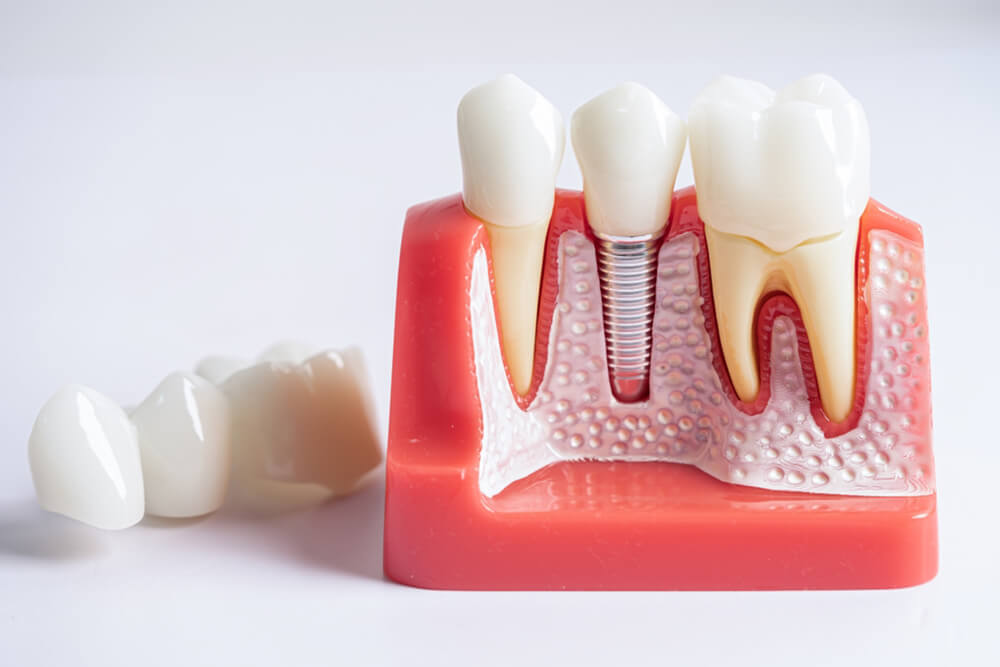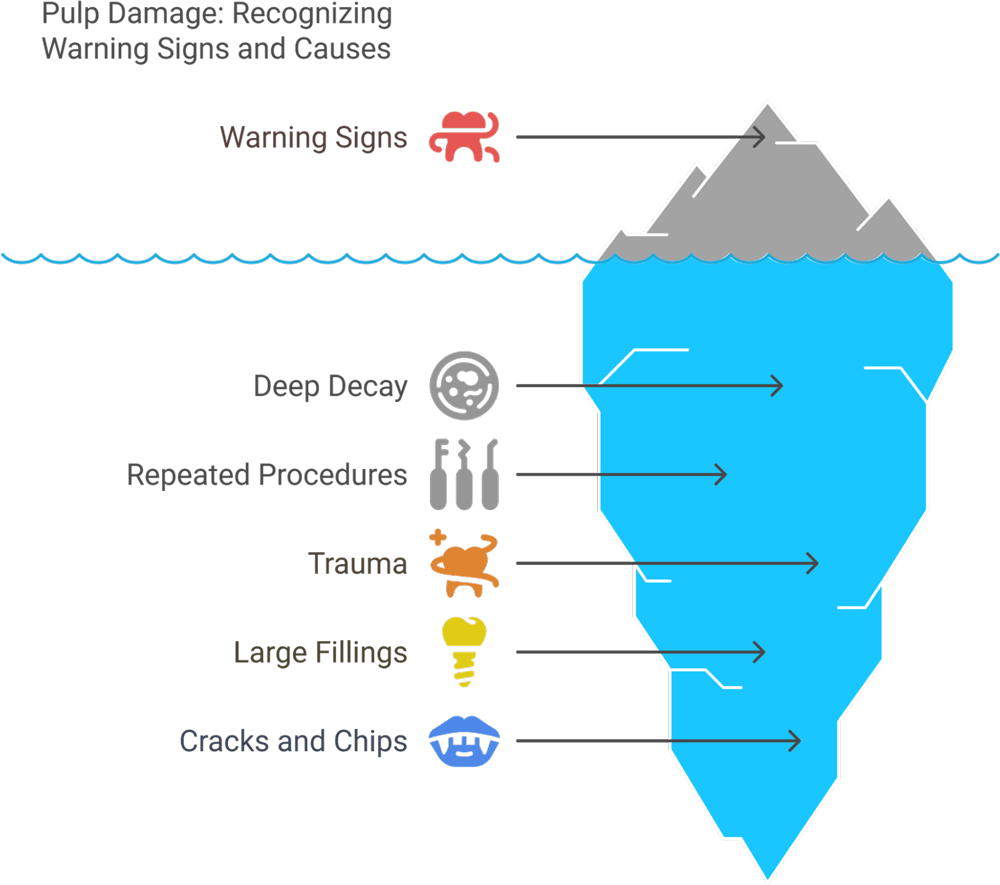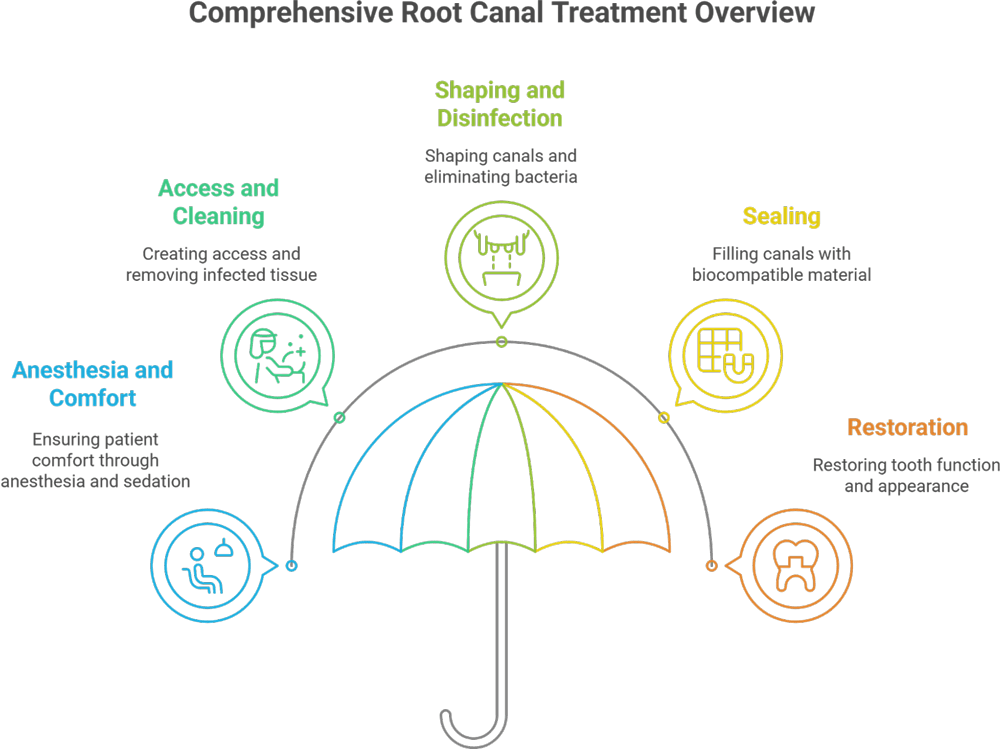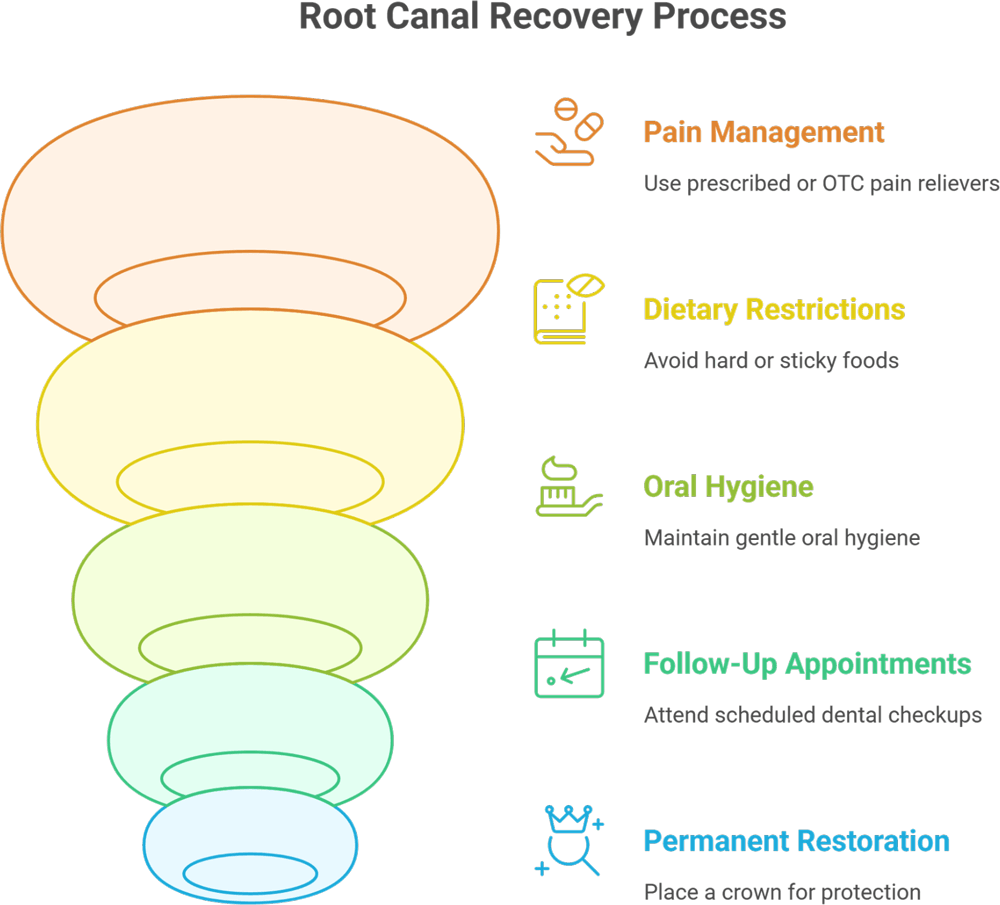- Home
- Root Canal Therapy in Brampton
Root Canal Therapy: Saving Your Natural Teeth with Advanced Endodontic Care

Understanding Root Canal Therapy: Debunking the Myths

Root canal therapy has an undeserved reputation as one of dentistry’s most painful procedures.
In reality, modern root canal treatment is no more uncomfortable than having a large filling placed, and it’s designed to eliminate pain, not cause it.
The procedure has evolved dramatically over the past decades, with advanced techniques and technology making it highly successful and surprisingly comfortable.
What Exactly Is Root Canal Therapy?
Root canal therapy, also called endodontic treatment, is a procedure that treats the infected or severely inflamed pulp (the soft tissue inside your tooth that contains nerves, blood vessels, and connective tissue).
Rather than extracting the tooth, we carefully remove the damaged pulp, clean and disinfect the inner chambers, then seal the space to prevent further infection.
When Do You Need Root Canal Therapy?

Severe, Persistent Pain – Pain that doesn’t subside with over-the-counter medications, especially pain that wakes you at night or throbs continuously.
Temperature Sensitivity – Lingering pain after consuming hot or cold foods and beverages that doesn’t go away quickly.
Pain When Chewing – Discomfort or sharp pain when biting down or applying pressure to the tooth.
Swelling and Tenderness – Swelling in the gums near the affected tooth, sometimes accompanied by a small pimple-like bump.
Tooth Discoloration – A tooth that becomes noticeably darker than surrounding teeth, indicating potential nerve death.
Chronic Bad Taste – Persistent bad taste or odor that doesn’t improve with normal oral hygiene.
Common Causes of Pulp Damage
Deep Decay – Cavities that have progressed deep enough to reach the tooth’s pulp chamber.
Repeated Dental Procedures – Multiple treatments on the same tooth can eventually irritate the pulp beyond repair.
Trauma – Sports injuries, accidents, or even grinding and clenching can damage the pulp, sometimes years after the initial incident.
Large Fillings – Extensive fillings that compromise the tooth’s structure can lead to pulp irritation.
Cracks and Chips – Even small cracks can allow bacteria to reach the pulp, causing infection.
The Root Canal Process: Step-by-Step

Initial Consultation and Diagnosis
We begin with a comprehensive examination, including digital X-rays and possibly 3D imaging to assess the tooth’s condition and surrounding bone structure.
We may also perform pulp vitality tests to determine the extent of nerve damage.
The Treatment Procedure
Anesthesia and Comfort – We ensure complete numbness using local anesthesia. For anxious patients, we offer sedation options to help you feel completely relaxed.
Access and Cleaning – A small access hole is created in the tooth’s crown to reach the pulp chamber. Using specialized instruments, we carefully remove the infected or inflamed pulp tissue.
Shaping and Disinfection – The root canals are carefully shaped and thoroughly disinfected to eliminate bacteria and prevent reinfection. This process may require multiple appointments for complex cases.
Sealing – Once completely clean, the canals are filled with a biocompatible material called gutta-percha and sealed with adhesive cement.
Restoration – The access hole is sealed with a temporary or permanent filling. Most teeth will need a crown to restore full strength and function.
Advanced Technology for Superior Results
Rotary Endodontics – Electric handpieces that clean canals more efficiently and comfortably than traditional hand files.
Digital Imaging – Precise X-rays and 3D scans that allow us to see exactly what we’re treating.
Microscopic Precision – High-powered microscopes that enable us to see tiny details inside the tooth for more thorough treatment.
Ultrasonic Irrigation – Advanced cleaning systems that remove bacteria more effectively than conventional methods.
Recovery and Aftercare: What to Expect

Immediate Post-Treatment
Most patients experience mild discomfort for a few days after root canal therapy, similar to what you might feel after a large filling.
This is normal and typically manageable with over-the-counter pain relievers.
First 24-48 Hours:
- Take prescribed or recommended pain medication as directed
- Avoid chewing on the treated tooth until permanent restoration is placed
- Maintain regular oral hygiene, being gentle around the treated area
- Avoid hard or sticky foods that could damage the temporary filling
Long-Term Success
Root canal therapy has a success rate of over 95%, and most treated teeth last a lifetime with proper care.
The key to long-term success is:
- Completing all recommended follow-up appointments
- Placing a permanent restoration (usually a crown) promptly
- Maintaining excellent oral hygiene
- Regular dental checkups and cleanings
Root Canal vs. Extraction: Making the Right Choice

Benefits of Saving Your Natural Tooth
Preserving Function – Your natural tooth provides the best chewing efficiency and maintains proper bite alignment.
Preventing Bone Loss – Keeping your natural tooth root preserves the surrounding bone structure.
Cost-Effective – Root canal therapy followed by a crown is typically less expensive than extraction followed by implant placement.
Avoiding Adjacent Tooth Problems – Keeping your natural tooth prevents neighboring teeth from shifting and becoming misaligned.
When Extraction Might Be Necessary
While we always try to save natural teeth, extraction might be recommended if:
- The tooth structure is too severely damaged to restore
- The root is fractured beyond repair
- Severe bone loss around the tooth makes it non-restorable
- The cost of restoration exceeds the tooth’s long-term value
Managing Pain and Anxiety
Pain Management Strategies
Contrary to popular belief, root canal therapy doesn’t cause pain – it eliminates it. Most discomfort comes from the infection, not the treatment. We use several approaches to ensure your comfort:
Effective Anesthesia – Multiple techniques to ensure complete numbness throughout the procedure.
Gentle Techniques – Modern instruments and methods that minimize tissue trauma.
Anti-Inflammatory Medications – Pre-treatment medications that reduce post-operative discomfort.
Anxiety Management
We understand that dental anxiety is real and valid. Our approaches include:
- Clear communication about each step of the process
- Sedation options ranging from nitrous oxide to oral sedation
- Comfortable environment with amenities to help you relax
- Experienced team trained in anxiety management techniques

The Importance of Prompt Treatment
Delaying root canal therapy when it’s needed can lead to:
- Spreading infection that may require hospitalization
- Tooth loss necessitating more complex and expensive replacement options
- Damage to surrounding teeth and bone
- Chronic pain that affects your quality of life
Special Considerations

Pregnancy and Root Canal Therapy
Root canal therapy is safe during pregnancy, especially during the second trimester.
Treating dental infections promptly is important for both maternal and fetal health.
Root Canal Retreatment
Sometimes, a tooth that has had root canal therapy may need retreatment if:
- New decay exposes the root canal filling to bacteria
- A crown or filling becomes loose or broken
- New trauma occurs to the tooth
Retreatment is often successful and can save the tooth for many more years.
Why Choose Smile Makers Dental for Root Canal Therapy
Expertise and Experience
Our team has extensive training in endodontic procedures and stays current with the latest techniques and technology.
We’ve successfully treated thousands of cases, from simple to complex.
Comprehensive Care
We coordinate your entire treatment from diagnosis through final restoration, ensuring seamless care and optimal results.
Patient Comfort Focus
Your comfort and peace of mind are our priorities. We take time to explain your treatment, answer your questions, and ensure you feel confident about your care.
Advanced Technology
Our investment in the latest endodontic technology means more precise treatment, better outcomes, and greater comfort for our patients.
Protecting Your Investment
After root canal therapy, proper care ensures your treated tooth lasts a lifetime:
- Complete all recommended treatment phases
- Maintain excellent oral hygiene
- Wear a night guard if you grind your teeth
- Avoid using your teeth as tools
- Keep up with regular dental checkups
Don’t let tooth pain control your life or risk losing a natural tooth that can be saved. Root canal therapy is a proven, comfortable solution that preserves your smile and oral health.
Experiencing tooth pain or think you might need root canal therapy? Call our office at 905-457-0778 or fill out our online form to schedule your consultation. Our experienced team will evaluate your situation, explain your options, and provide the gentle, expert care you need to get back to optimal oral health.
















